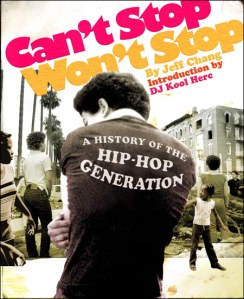Can’t Stop, Won’t Stop: A History of the Hip-Hop Generation
Jeff Chang ( Picador, 2005 )

I came to Hip-Hop late in the piece. I dabbled with N.W.A.’s Straight Outta’ Compton back in early high school, like every other adolescent who got a giggle out of their hyper-masculine and expletive riddled tales of guns and bitches. But at the time, I didn’t understand the racial tensions and politics driving that album.
I grew up in a world were you were either into guitars, or the sample based sounds of Hip-Hop. I was into Metallica. And despite Anthrax kicking ass with Public Enemy, the Red Hot Chili Peppers stirring my interest in funky rhythms, and Sonic Youth pairing up with Chuck D, I remained faithful to the guitar into my twenties. I laughed at Ice T when Body Count played the infamous Alternative Nation festival at Olympic Park in 1995.
I might be a convert now, but I’m no expert on the history of Hip-Hop. So I picked up Can’t Stop, Won’t Stop excited to learn about how the scene came together and arrived where it’s at today.
I was disappointed.
Can’t Stop, Won’t Stop isn’t a bad read. In fact it’s a thoroughly researched examination of black history and culture. However its title and blurb are quite misleading.
Chang uses Hip-Hop as a springboard to discuss the history of Black American culture, from oppression and Jamaican struggles, to tightrope walking equality in the new millennium (he wraps it up around 2001). This is interesting and poignant stuff, but don’t be fooled into thinking that Chang’s book is an exploration of the Hip-Hop movement you might be familiar with, because it’s not.
There are huge chunks of the genre, which ignorant little ol’ me know to be significant in its evolution, that Chang barely touches upon. Wu-Tang Clan with their absolutely capitalist stance and boundary breaking beats get nary a mention. It seems Chang isn’t aware that Tupac and Biggie Smalls were murdered, or doesn’t consider the events important enough to explore.
Suge Knight in jail and speculation of his involvement in the murders of Tupac and Biggie, not to mention conspiracy theories about the involvement of the police in said murders? Nothing.
A Tribe Called Quest, Mos Def, Talib Kweli, De La Soul and every other positive MC and their ties to Blues and Jazz music? Barely a mention.
Vanilla Ice, Eminem, Beastie Boys and the rise of white rappers in the context of a predominately black music scene? Uh uh, no mention.
Boo Ya tribe, Cypress Hill, Mobb Deep, Snoop Dogg and the dangers of Gangsta Rap? Very little, beyond telling us that conservatives don’t like N.W.A (well, duh).
What about the rise of experimental Hip Hop labels like Anticon and Def Jux, and their rebellion against the clichés that much of modern Hip-Hop stands for today? I don’t think Chang’s even aware of this subculture.
Chang seems to focus on the power of Hip-Hop to fix problems between black and white communities in America. And for the most part, he pretends that there are absolutely no negative forces at work within Hip-Hop. What I mean by that is, he appears to ignore the deaths of people like Biggie Smalls and similar events because he doesn’t want to tarnish the positive image he paints for the movement. And in doing so, he forgoes the exploration of Hip-Hop’s interesting, and challenging contradictions and dilemmas.
On his website www.cantstopwontstop.com, Chang says he didn’t want to write a book about Hip-Hop in terms of rap music. He says that “Hip-Hop offers a generational worldview that encompasses the shoes you choose, to whether you’re inclined to vote or not, to how you understand the issue of race. So I use this worldview to look at the last three decades of the American century.”
I agree with his intent whole-heartedly, but I’m disappointed that he leaves major parts of the culture untouched. I felt confused about why thinks the music, the breaking, the graff and clothes can be such a positive influence on people. It was hard to make this link when he spends 50 pages discussing the political implications of Rodney King’s death, quoting numerous black scholars and activists, but doing little to tie it all back into Hip-Hop culture (save for mentioning that the police didn’t like Bodycount’s Cop Killer. Well, duh).
The jacket of Can’t Stop, Won’t Stop is covered in praise from The New Yorker to Vibe magazine to Publisher’s Weekly. So maybe I’m missing something here?
Re-reading the above, perhaps I’m being a little harsh. But overall I was disappointed in this book. Pick it up if you’re prepared for a history lesson in racial politics. Perhaps give it a miss if you’re after some insight into Hip-Hop as a musical culture.



 Drone merged with rhythm. For me, this is a perfect marriage. In theory, anyway. A few years back I picked up Dalek’s album Abscence based on the fact it was released by Mike Patton’s Ipecac label and that it promised to conjure the doom of Black Sabbath riffing with head nodding beats. And it did that, but after a few listens I lost interest. The tracks on Absence began to sound the same, and MC Dalek’s rhymes were too ‘hip-hop’ for the mood of the samples.
Drone merged with rhythm. For me, this is a perfect marriage. In theory, anyway. A few years back I picked up Dalek’s album Abscence based on the fact it was released by Mike Patton’s Ipecac label and that it promised to conjure the doom of Black Sabbath riffing with head nodding beats. And it did that, but after a few listens I lost interest. The tracks on Absence began to sound the same, and MC Dalek’s rhymes were too ‘hip-hop’ for the mood of the samples.
